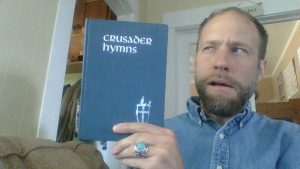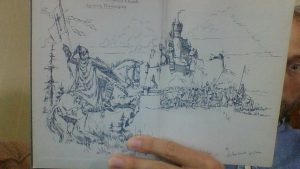Into Eternity
The church I grew up in was and is amazing, but we used to sing from a hymnal in the evening service named, “Crusader Hymns” and although the songs were totally well known Evangelical hymns, looking back the title of our songbook was less than savory. I mean we certainly weren’t advocating the actions of the crusaders, but in those days Billy Graham had a “Crusade” every other year or so and we didn’t think about the implication for a Muslim or Jew at the time. Eventually they phased out these hymnals. I still love the songs, which have nothing to do with the Crusades, only love for Christ, but it got me thinking and I pulled out a piece of writing of mine from the very early 2000’s concerning this subject that I thought was worth sharing:
Into Eternity
As a warrior goes forward it is a strange mixture of courage and fear. Yet the power of the true warrior is God himself. This kind of warrior almost rests in His action, letting that Power guide him, yet using all that strength that can be mustered from Him. It is the flow, focused, yielded, stern. And this battle is not with flesh and blood . The true warrior battles within himself, or herself.
Thomas meets her by a stream, as he explores its edge, so he spots a young woman, as young as he, and she notices him as well. She is there on a different kind of exploration: to find flowers and put them in her hair.
“Hello,” says he shyly, but smiling.
“Hello,” she responds, smiling back at him.
“A beautiful day…” as he looks up at the shining sky.
“It is.” She nods, still smiling.
And they pass each other by.
He is enlisted for war, not understanding its purpose, yet loyal to his father; his father is loyal to the Pope.
And the Pope has ordered the taking of Jerusalem.
Thomas would go on the following day.
‘But who is this lady?’ he asks himself.
The next day, before his departure, he spots her again. He ambles down to the stream again, to reflect. And there she is.
“Hello again, my lady.”
“Hello,” she responds, again with a smile.
And he, “What is your name, if I may ask?”
“Esther. And you?”
“Thomas.”
They nod to each other, smiling.
She hesitates…“Are you going to the war?”
“Yes, my lady,” he says, now without much expression.
They are silent, looking at each other.
“I wish you well.”
“Thank you, my lady.”
Silence again and he ends it. “I must go. Good day.”
“Good day.” She curtsies.
With a nod Thomas is off, a rendezvous with his father and fellow men. And all of them are off in good time, brandishing sword and shield. Onward and they meet with the army.
They set out quickly the following morning. In two days time they are beyond their homelands. In two weeks they enter battle on the borders of their own country. In two months time they are in the thick of it.
Thomas learns battle quickly. His uncle’s arm is hacked off in the first waves, his uncle falls and dies in agony as Thomas watches, then fighting from fear and it turns to courage in time, but he is still unsure of its purpose. To the homeland of the Christ, yet why all the bloodshed? Is this really the will of God? He wonders, but fights on.
But in the third month his father becomes ill; he requests an escort, his son, back to their homeland. Granted it is, on the condition that Thomas would return with able bodied young men behind him. Reluctantly Thomas accepts it.
In another month, Thomas and his father make it back to their homeland. Yet his father is more ill than ever by that time and, in a few days, is dead.
Thomas stays for the funeral, comforts his family as best he can with tidings of the battles, and on the fifth day walks down to the stream, alone.
There she is. But, noticing him, she does not seem to notice.
“Hello.”
No answer.
“Hello, Esther?”
She turns, now with bridled anger. “How much blood has been shed, Thomas? What brings you here?”
She is flushed now.
“My father fell sick and is dead.” He is without expression.
She looks to the ground. “I am sorry,” but still distant.
“What vexes you, my lady?”
Her skin color returns to normal. “I have been thinking, Thomas, about war and blood and God.”
“Yes?” He frowns.
“What purpose does it serve?”
“Which, war, blood, or God?”
“War and God if He wills it.”
“I know not, my lady.”
“Then why do you fight?”
Both expressions are calmer. “Because it is their order and because…I know not.”
“But whose order is it?”
“The Pope.”
“Is it therefore God’s order?”
“I know not.”
“Neither do I.” She shows vulnerability this time as she looks to the ground.
“Have you prayed?” He looks at her.
“They tell us to pray for the siege of Jerusalem.”
“What do you pray?”
Still looking at the ground, says she, “I tell Him my thoughts and ask Him to forgive me if I be wrong.”
“What would you be wrong in thinking? What are these thoughts? Possibly they are right.”
“Possibly. But they are not the Pope’s. Thomas I wonder if God really wants this crusade, this bloodshed?”
“As do I, my lady.”
“If He forgives us, why not them?”
“Not even the nobles could answer that. Are you a noble my lady, by birth?”
“Somewhere betwixt peasantry and nobility.”
“As am I. We cannot answer it.”
“But let the peasants build the palaces of God, while the bishops build their own palaces of wealth. Does that seem God’s will to you, Thomas?”
“Nay, but who am I?”
“Indeed, or I? May God forgive our insolence if we question Him wrongly.”
“And may God forgive us all if we do so rightly.”
She gazes up at him with concern. “Indeed. May their blood not be on our heads.”
“If that blood is wrongly shed, I am sure it is not on yours, my lady.”
“Nor yours, dear sir.”
“Ah, but I have shed it.”
“In duty, not in spirit.” Now her eyes plead with his. “Come away with me. Let us run to the mountains. I know a wandering Friar there; he will marry us. They cannot find us there.”
Thomas smiles. “You have won my heart, from the moment I saw you, lady. And I shall accept your plan. Let us run there and marry before God, protesters of the Catholic Church and let Him decide our fate.”
Esther smiles broadly.
Thomas holds out his hand to her, she takes it. They come to his horse, gather provisions and ride for the mountains. They do all they had dreamed to do, feeling some guilt, but more innocence than ever. These are Protestants, but not the first. There have been many since the first days of the Church, only some have been seen by history. Most have not. All have been seen by their Lord on into eternity.

